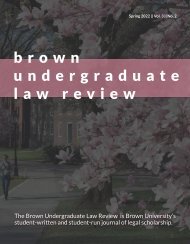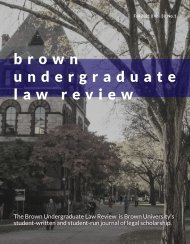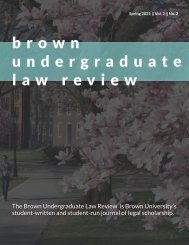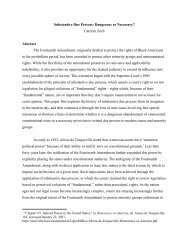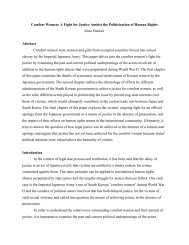From Frontiero to the Air Force: Citizenship and Equal Protection in U.S. Reproduction Jurisprudence
Olivia Siemens '21
Olivia Siemens '21
Create successful ePaper yourself
Turn your PDF publications into a flip-book with our unique Google optimized e-Paper software.
changed its discharge policy, and the Supreme Court did not grant the ACLU’s petition
43 44
certiorari.
Justice Lewis F. Powell, Jr., however, voted to hear Struck. His case notes, now a matter
of public record, indicate that at least some members of the judiciary had in fact recognized
reproductive autonomy as an equal protection issue. Far from seeing some abstract violation of
Captain Struck’s privacy, Justice Powell writes that the question at hand was “whether the state
may discriminate against women in terms of required leave when they do not impose the same
requirements on other temporary disabilities.” He concludes that it likely could not, arguing on
the basis of equal protection that “where the sex discrimination touches on some aspect of the
procreative process, a higher standard of scrutiny should be applied. Only women bear children:
the disabilities associated with pregnancy only befall women.” 45
Powell is entirely correct. His argument, underscoring the intimate connection between
equality and reproductive autonomy, points out that the government's attempt to interfere in
Struck’s “procreative process” plainly subverted equal protection. The Air Force had forced
pregnant female service members to choose between their children and their employment while
requiring no such tradeoff for prospective male parents. Moreover, the procedural rights enjoyed
by disabled men were not similarly extended to pregnant women; pregnancy, unlike other
temporary “disabilities,” constituted automatic grounds for dismissal. Once again, the
government had denied women the equal protection of the laws based solely on their immutable
sex characteristics—an arbitrary condition of their birth.
The fact that two categories of similarly situated citizens might hold different rights and
privileges based on their innate sex characteristics runs counter to the Fourteenth Amendment’s
equal protection guarantee and Ely’s proceduralist reading of the Constitution. Reproductive
restrictions such as those reviewed in Roe, Casey, Gonzales, and Struck subject women alone to
state-imposed constraints on their liberty, thus depriving them of their opportunity to participate
fully in the social, economic, and political realms of citizenship. Male citizens, on the other hand,
43
Jan Eric Peterson, “Pick Your Battles,” New Yorker, October 15, 2018,
https://www.newyorker.com/magazine/2018/10/22/letters-from-the-october-22-2018-issue.
44
A party seeking to appeal to the Supreme Court from a lower court decision must file a writ of certiorari, which
the justices will review prior to agreeing to hear such an appeal. See: “Certiorari,” Cornell Legal Information
Institute, https://www.law.cornell.edu/wex/certiorari.
45
Lewis F. Powell, Jr., “Struck v. Secretary of Defense,” Supreme Court Case Files, 582, October 13, 1972,
https://scholarlycommons.law.wlu.edu/casefiles/582.
14




